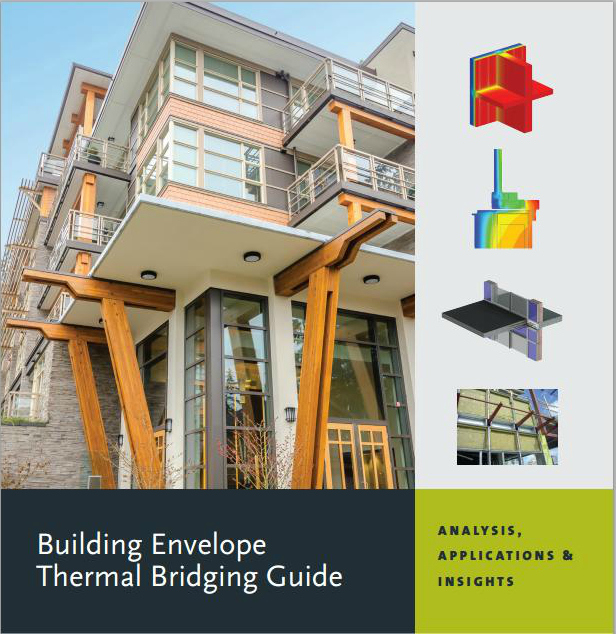Morrison Hershfield has announced that the Building Envelope Thermal Bridging Guide – Analysis, Applications, and Insights is now public and can be downloaded from BC Hydro. The guide aims to overcome obstacles confronting the industry with respect to mitigating thermal bridging to reduce energy consumption in buildings.
The guide was developed by Morrison Hershfield in collaboration with co-sponsors and industry partners. Co-sponsors include BC Hydro Power Smart, Canadian Wood Council, Fortis BC, FPInnovations, and Homeowner Protection Office. Industry partners helped extend the scope of the guide to include many additional details.
The principle goal of these collaborating organizations is to promote energy-efficiency in buildings by increasing awareness of the impact of and methods to mitigate thermal bridging. To meet these goals, the guide addresses a number of obstacles currently confronting our industry by:
-
Cataloging the thermal performance of common building envelope assemblies and interface details.
-
Providing data-driven guidance that will make it easier for the industry to comprehensively consider thermal bridging in building codes and bylaws, design, and whole building energy simulations.
-
Examining the costs associated with improving the thermal performance of opaque building envelope assemblies and interface details, and forecasting the energy impact for several building types and climates.
-
Evaluating the cost effectiveness of improving the building envelope through more thermally efficient assemblies, interface details, and varying insulation levels.
-
The guide, which is broken into three main sections for ease of use, contains helpful information for technical committees for energy standards, regulators, utilities, architects, mechanical designers, building envelope consultants, energy modellers, developers, manufacturers and trade organizations.
The guide outlines how to effectively account for thermal bridging and is backed up by an extensive catalogue of thermal performance data. This information is essential for practitioners evaluating building envelope thermal performance.
Researchers and regulators will be interested in the sections focused on market transformation, which includes an evaluation of cost effectiveness and energy savings in common large building types.
Related Stories
AEC Tech Innovation | Oct 8, 2024
New ABC technology report examines how AI can enhance efficiency, innovation
The latest annual technology report from Associated Builders and Contractors delves into how artificial intelligence can enhance efficiency and innovation in the construction sector. The report includes a resource guide, a case study, insight papers, and an essay concerning applied uses for AI planning, development, and execution.
Healthcare Facilities | Oct 8, 2024
Herzog & de Meuron completes Switzerland’s largest children’s hospital
The new University Children’s Hospital Zurich features 114 rooftop patient rooms designed like wooden cottages with their own roofs. The project also includes a research and teaching facility.
Mixed-Use | Oct 7, 2024
New mixed-use tower by Studio Gang completes first phase of San Francisco waterfront redevelopment
Construction was recently completed on Verde, a new mixed-use tower along the San Francisco waterfront, marking the end of the first phase of the Mission Rock development. Verde is the fourth and final building of phase one of the 28-acre project that will be constructed in several phases guided by design principles developed by a design cohort led by Studio Gang.
Brick and Masonry | Oct 7, 2024
A journey through masonry reclad litigation
This blog post by Walter P Moore's Mallory Buckley, RRO, PE, BECxP + CxA+BE, and Bob Hancock, MBA, JD, of Munsch Hardt Kopf & Harr PC, explains the importance of documentation, correspondence between parties, and supporting the claims for a Plaintiff-party, while facilitating continuous use of the facility, on construction litigation projects.
Glass and Glazing | Oct 7, 2024
Pattern language: An exploration of digital printing on architectural glazing
Architectural Glazing has long been an important expressive tool which, when selected and detailed thoughtfully, can contribute to the successful transformation of architectural concepts to reality.
University Buildings | Oct 4, 2024
Renovations are raising higher education campuses to modern standards
AEC higher ed Giants report working on a variety of building types, from performing arts centers and libraries to business schools. Hybrid learning is seemingly here to stay. And where possible, these projects address wellness and mental health concerns.
AEC Tech | Oct 3, 2024
4 ways AI impacts building design beyond dramatic imagery
Kristen Forward, Design Technology Futures Leader, NBBJ, shows four ways the firm is using AI to generate value for its clients.
Laboratories | Oct 2, 2024
Trends in scientific research environments: Q&A with Flad's Matt McCord
As part of an ongoing series, Matt McCord, AIA, NCARB, LEED AP BD+C, Associate Principal with Flad Architects, discusses the future of the scientific workplace.
Museums | Oct 1, 2024
UT Dallas opens Morphosis-designed Crow Museum of Asian Art
In Richardson, Tex., the University of Texas at Dallas has opened a second location for the Crow Museum of Asian Art—the first of multiple buildings that will be part of a 12-acre cultural district. When completed, the arts and performance complex, called the Edith and Peter O’Donnell Jr. Athenaeum, will include two museums, a performance hall and music building, a grand plaza, and a dedicated parking structure on the Richardson campus.
Data Centers | Oct 1, 2024
10 biggest impacts to the data center market in 2024–2025
While AI sends the data center market into the stratosphere, the sector’s accelerated growth remains impacted by speed-to-market demands, supply chain issues, and design innovation necessities.

















